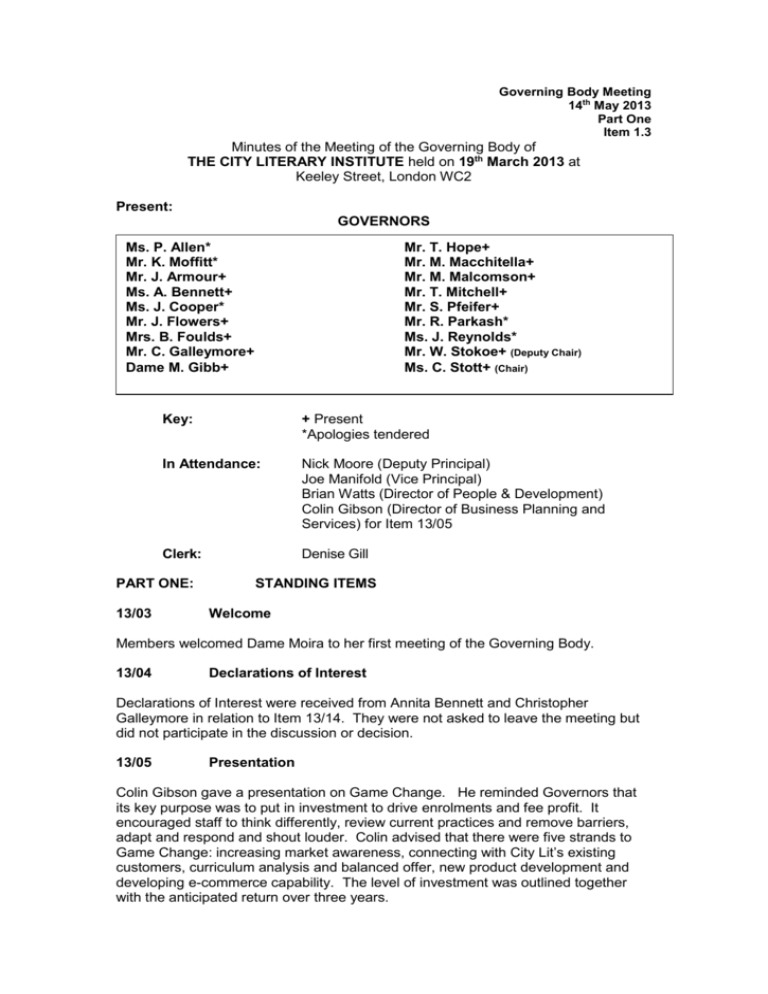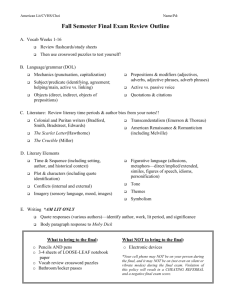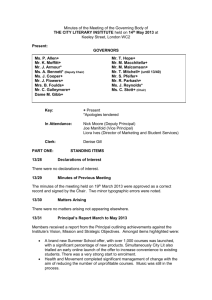Minutes of the Meeting of the Governing Body of
advertisement

Governing Body Meeting 14th May 2013 Part One Item 1.3 Minutes of the Meeting of the Governing Body of THE CITY LITERARY INSTITUTE held on 19th March 2013 at Keeley Street, London WC2 Present: GOVERNORS Ms. P. Allen* Mr. K. Moffitt* Mr. J. Armour+ Ms. A. Bennett+ Ms. J. Cooper* Mr. J. Flowers+ Mrs. B. Foulds+ Mr. C. Galleymore+ Dame M. Gibb+ Key: + Present *Apologies tendered In Attendance: Nick Moore (Deputy Principal) Joe Manifold (Vice Principal) Brian Watts (Director of People & Development) Colin Gibson (Director of Business Planning and Services) for Item 13/05 Clerk: Denise Gill PART ONE: 13/03 Mr. T. Hope+ Mr. M. Macchitella+ Mr. M. Malcomson+ Mr. T. Mitchell+ Mr. S. Pfeifer+ Mr. R. Parkash* Ms. J. Reynolds* Mr. W. Stokoe+ (Deputy Chair) Ms. C. Stott+ (Chair) STANDING ITEMS Welcome Members welcomed Dame Moira to her first meeting of the Governing Body. 13/04 Declarations of Interest Declarations of Interest were received from Annita Bennett and Christopher Galleymore in relation to Item 13/14. They were not asked to leave the meeting but did not participate in the discussion or decision. 13/05 Presentation Colin Gibson gave a presentation on Game Change. He reminded Governors that its key purpose was to put in investment to drive enrolments and fee profit. It encouraged staff to think differently, review current practices and remove barriers, adapt and respond and shout louder. Colin advised that there were five strands to Game Change: increasing market awareness, connecting with City Lit’s existing customers, curriculum analysis and balanced offer, new product development and developing e-commerce capability. The level of investment was outlined together with the anticipated return over three years. The Board was then informed of the progress that had been made to date and the next stages which included the continuation of departmental strategic planning, longer term financial planning, phasing of the e-commerce project and trialling of staff advocacy. Other initiatives planned for May were ensuring an outstanding experience for students, driving repeat business, building brand awareness and new product development and innovation. Governors welcomed the update and asked how staff advocacy was being trialled. Colin advised that the priority was engaging part-time staff and persuading them to encourage students to continue learning at City Lit and to recommend it to their friends. Staff development sessions were being arranged to support this objective. Colin was also asked what the biggest challenge was. He responded that it was the website which currently did not have a shopping basket system and discounting and bundling could not be taken through the it at the current time. Members thanked Colin for a very interesting presentation and asked to be kept informed of developments. 13/06 Minutes of Previous Meeting The Minutes of the meeting held on 11th December 2012 were approved and signed. 13/07 Matters Arising Not Appearing Elsewhere There were no matters arising not appearing elsewhere. 13/08 Principal’s and Chair’s Report December 2012 to March 2013 Members received a report from the Principal outlining achievements against the Institute’s Vision, Mission and Strategic Objectives. Amongst items highlighted were: The award of Investors in People Gold which was enhanced to Champion status. The visit from Sir Michael Wilshaw HM Chief Inspector and Matthew Coffey, National Director, Learning and Skills at Ofsted. Continued discussions about a potential merger with Kensington & Chelsea College and with Blackheath Conservatoire with regard to collaboration. Strategic Department Reviews with Music, Health & Movement going though significant management of change with the aim of reducing the number of unprofitable courses. The new teaching and learning strategy had been widely consulted on and was nearing completion in preparation for full implementation from September. The new student experience strategy had been developed and a new student experience manager post created. The new Transfer and Refund policy has been implemented to be more student/customer friendly and flexible. The self-assessment (SAR) process was completed, peer review was introduced and a number of Governors joined the discussions. A classroom renovation and improvement project had been launched. Bid made to Kensington and Chelsea Borough to deliver an enterprise project working with disadvantaged learners to develop products to sell on Portobello Market. Successful delivery of the community learning project for Lambeth Borough had led to City Lit being invited to bid for further work. New apprenticeship programme started with a homeless charity in South London. 6th floor was refurbished and incorporated Deaf Education staff. Reaction was positive, with most staff agreeing that the changes improve the working environment. Bringing Deaf Education staff physically into the mainstream of the College has been overwhelmingly welcomed by Deaf and non-Deaf staff alike. The refurbishment of the 6th floor allowed for an enlarged part-time teachers’ room that will seat up to 11 staff. Two just-in-time print stations were also set up in the photocopying room. The College received an extra £1.4m from the SFA as a result of overperformance in the last academic year. Enrolments had rebounded in term two with over 1,000 more enrolments than this time last year. Summer School is being revamped and extended into mid August with over 400 courses added to the summer offer. Risk management has been revised to reflect the new strategic plan. The Chair of Governors then presented her report. She advised that she had attended two consultation events on the development of an FE Guild and having taken on board comments from staff, she prepared a formal response as Chair of City Lit, a copy of which was appended to the report. She informed members that the response had been largely supportive but had addressed issues of funding, purpose, practitioner engagement and governance for the new organisation. An implementation plan for the Guild was expected by the end March subject to consultation responses. Members were also informed that in January she had attended a reception at Lancaster House for college governors. The reception had been organised to recognise and mark the work and contribution of college governors and had been very well attended. It had included a substantial and robust Q&A session with the Minister, Matthew Hancock. As a result, BIS were establishing a Ministerial Advisory Group on College Governance focusing on Board composition and diversity; models of governance; and approaches to incentives. She had been asked to join this group which would work between March and May and produce a report for the Minister by end May. The group would also establish processes for wider consultation across the governance community. The Chair then advised that she had met Matthew Hancock and officials again in February with members of AoC’s Governors’ Council and he had asked the Council to undertake work on future support for College Governors after LSIS ceased to operate in August 2013. An initial project from April – July would undertake research and consultation to scope needs and models. It was expected that the Council would direct and oversee support initially from August but that the role would eventually be taken on by the Guild. The Board was then informed that the Chair had joined the FE Working Group of the Skills Taskforce which had been set up by the Labour Party (with non-political membership) to inform policy development on Skills ahead of the next election. The group had met twice and to date had largely focused on the “Tec Bach” and qualifications, a topic which seemed to remain a primary focus for politicians. Given the continuing economic situation, the imminent comprehensive spending review and the limited scope within BIS to make cuts elsewhere, it was more important than ever that Governors continue to lobby on the importance of City Lit and adult education in contributing to economic and social progress. Finally, members were informed that she had attended the LSIS Governance Conference 14th & 15th March along with the Clerk and Dame Moira Gibb for part of the event. This was the last such conference to be organised by LSIS. The Principal and Chair were thanked for their report. 13/09 Date of Next Meeting Members noted that the next meeting would be held on 14th May. The Review Session would commence at 2.30 pm and the Ordinary General Meeting would commence at 5.00 pm. PART TWO: 13/10 MATTERS FOR DECISION Self Assessment Report 2012 The Board received a summary of the Self Assessment Report 2012. Members were advised that the full SAR had been discussed in detail by the Quality and Standards Committee at a dedicated meeting in January 2013. The summary did not contain all the individual programme and service area SARs but included a table of all grades. The Deputy Principal advised that grade changes from 2011 were: - Music from 1 to 2 due to difficulties with change in management. Psychology and Counselling from 1 to 2 due to some late portfolio submissions lowering the accredited success rate. Progress from 1 to 2 in light of feedback from a mock-inspection. Members were informed that overall effectiveness remained outstanding, despite reductions in some departments’ overall grades as a result of applying the refocused criteria in the new Common Inspection Framework. 37% of departments were graded as outstanding, 63% good and none ‘in need of improvement’ or poor. Governors discussed the report and it was suggested that where there had been a downgrade from Grade 1 to 2 then the action plans should be brought to the Board so that they could be monitored. The Chair stated that the Quality and Standards Committee would be scrutinizing progress and was encouraging more Governors to participate in the SAR meetings. The Board approved the Self Assessment Report 2012. 13/11 College Refurbishments The Deputy Principal introduced a paper about classroom refurbishment that had been circulated with the agenda. Nick explained that there had been no significant refurbishment or redecoration of classrooms in Keeley Street since their original completion eight years ago in 2005. He advised that classroom and studio utilisation was extremely high with most of the 77 spaces in use 12 hours per day, 7 days per week. He added that a classroom could be used by as many as 7 classes each day, possibly by as many different teachers. Members were informed that the creation of new classrooms, most recently the five on the 1st floor, had highlighted how shabby the older rooms have become. However, it was more than a cosmetic issue remedied by a coat of paint and the disposal of unsightly clutter. Most classrooms now lacked satisfactory ILT resources and many of the ‘general classrooms’ had inadequate furniture, some brought from Stukeley Street. Additionally, recent mock inspections had recommended reconsidering room layouts in relation to ILT and furniture – in more than one case pointing out that it had prevented teaching and learning being ‘outstanding’. One Inspector had pointed out that the attempt by a teacher to fully exploit the learning opportunities afforded by the Smartboard in itself raised health and safety trip hazard concerns because of overcrowding and room layout. Nick stated that a ’quality audit’ was currently being conducted of all classrooms to determine, room by room, what needed to be done. This entailed visiting every room, asking for teachers’ and departments’ feedback and checking inventories. The process had already highlighted the poor state of the cleanliness of rooms (and toilets and landings) particularly at the end of the afternoon prior to the start of evening classes. Even when teachers arrived early to set up and tidy the room they were confronted by over-spilling waste bins. City Lit was not therefore providing an outstanding teaching and learning experience. The report then set out in detail the work to be done in the areas of ILT, electrics, furniture replacement, carpeting, IT/computer teaching rooms and cleaning. Members were advised that the costs would be: 40 classrooms/studios need ILT and PC replacement, at a total cost of £115k. This would be capitalised and written off over 3 years. 23 classrooms required full refurbishment at a further cost of £7k each, a cost of £161k. 3 IT/computer teaching rooms needed reconfiguring at a total cost of approximately £30k. Nick stated that a total capital investment of £306k was being requested and an additional spend of £72k over two years was being requested to increase the frequency of classroom and toilet cleaning. In accord with the Financial Regulations, the Finance and Employment Committee had approved the proposed £115k funding for essential ILT and PC replacement in 40 classrooms and studios so that orders could be placed immediately to expedite installation and benefit from current discounts. The Committee was also recommended to the Governing Body the further refurbishment expenditure of £191k and cleaning expenditure of £72k. The Governing Body discussed the report and welcomed the refurbishment plan. It approved the proposed refurbishment expenditure of £191k and cleaning expenditure of £72k. 13/12 Treasury Policy The Vice Principal presented a report containing a recommendation from the Finance and Employment Committee that a revised Treasure Policy be approved. Joe advised that City Lit’s internal auditors, Parkhill, had made some recommendations relating to the policy which were that: The policy should be reviewed on a regular basis. The rating requirements in the policy were taken from two different agencies with differing indices. Parkhill had suggested that this should be clarified. Investment limits were currently expressed as a percentage of total investments. Parkhill suggested a monetary limit should also be included. The full text of the recommendations, with City Lit’s Management response, was attached to the report. In the light of the recommendations, it was proposed that: The Treasury Policy should be reviewed every 2 years or earlier if circumstances changed. The rating requirement in the policy should be amended to refer to the Fitch ratings scale. Investment limits should be maintained as a percentage of total deposits with no monetary limit. Attached to the report were: A proposed revised Treasury policy, A list of current funds held, with interest rates and maturity dates. A 3 year cash flow forecast. This provided an indication of likely balances available for deposit. Members discussed the report and recommendation from the Finance and Employment Committee and queried whether 18 months cash reserves was too cautious. The Vice Principal stated that the timetable would enable City Lit to optimise financial planning as some of the various elements would be already known. The Board approved the revised Treasury Policy. 13/13 Risk Management Policy The Deputy Principal presented a revised Risk Management Policy to the Board. He explained that it was reviewed annually by the Audit Committee and that some revisions had been recommended at the March meeting. A copy of the revised policy was included in the report and Nick advised that: The policy had been fully reviewed, including the risk rating values. Risk ownership was further clarified in the policy. The risk escalation process was better clarified. The role of the risk register and risk radar was now described in the policy. The Board approved the revised Risk Management Policy. 13/14 Election of Deputy Chair and Appointment of Chair of the Finance and Employment Committee The Clerk presented a report advising that the Deputy Chair of Governors, Bill Stokoe, was retiring from the Board in April 2013 and that the Search and Governance Committee was recommending that Annita Bennett be elected as Deputy Chair of Governors for a period of two years wef 26th April 2013 and that Christopher Galleymore be appointed Chair of the Finance and Employment Committee to ensure continuity to the Board and Committee. Following this recommendation Annita Bennett was nominated as Deputy Chair and this was unanimously supported. The Board also appointed Christopher Galleymore as Chair of the Finance and Employment Committee. PART THREE 13/15 MATTERS FOR REPORT Management Accounts to 31st January 2013 Members received the management accounts which showed the position for the six months ended 31st January 2013, and included a forecast for the year to 31st July 2013. Governors were advised that in November 2012 it had been reported that student fees shortfall was £810k. This has turned into a forecast fee shortfall for the whole year of £548k. Whilst this would still be significantly below budget it would still account for a 14% growth of fee income compared with the previous year. It was believed that there was still room to improve on this number over the next few months. This improvement in performance had been achieved by the following actions: Increased promotion and marketing both at a micro and macro level e.g. the Evening Standard, Time Out, Guardian, etc. Significantly changing staffing and support patterns to ensure the maximum access for students to enrol. Use of incentives and offers, which appears to have had significant financial benefit as well as creating goodwill with our students. More than doubling this year’s Summer School offer. Members were informed that the other significant change was that student numbers had made good progress. Whilst Term One student numbers were down by 300 (November) compared with the previous year, Term Two had seen a large increase of 750 (January) and that had meant that City Lit was now growing student numbers for the whole academic year. There was one significant unknown for the year, around funding. In the forecast used, the level of funding that City Lit was capped at had been budgeted. A preliminary return for the year to the SFA had been submitted and City Lit was overachieving by £1.8m, up on last year. There was a fair chance that last year’s precedent of paying out part or all of the overfunded amount might take place again this year. It would not be known until much later in the academic year but it was something to be aware of. It was forecast that there would be a favourable variance of £147k on grants and contracts, mainly due to strong performance of Community Outreach and Deaf & Disabled Support income. This was the result of several new funded projects being undertaken. It was also expected that there would be an under spend on sessional pay costs of £125k which was mainly related to the shortfall in fee income. However, these were expected to be offset by permanent pay and restructuring costs. A sessional pay under spend of £125k was expected, with pay in total to be on budget. Overall, it was forecast that there would be an accounting deficit for the year of £290k. However, this would still result in an operating cash surplus of over £300k, due to non-cash items (e.g. depreciation) included in the forecast accounting deficit. The total cash surplus was forecast to be £1.4m. This was after taking into account capital items and the additional £1.4m funding payment relating to 2011/12 over performance which was received from the Skills Funding Agency in January. These figures did not include potential additional funding for 2012/13 over performance. Governors discussed the report and further information was requested on why Community Outreach was performing so well. The use of reserves was also discussed and members advised that the Finance and Employment Committee would be considering the best investment strategy for safeguarding reserves. The Board noted the management accounts. 13/16 Investors in People The Director of People and Development presented a report informing members that City Lit had held the IIP standard since 1998 and at the last reassessment in July 2010 City Lit was accredited to the silver level. At the review meeting in August 2011 the assessor encouraged the Institute to consider aiming for gold accreditation before the expiry of the current accreditation as she considered that this would support its development post-inspection, stretch it and enhance its reputation. The full report was appended to the report and Governors were informed that as part of the assessment, nearly 10% of staff were interviewed or observed in meetings over 12 days in December 2012. ‘Gold’ accreditation was achieved, with all 39 core standards being met and a further 135 standards met from the wider framework. For the assessment to support the development of City Lit, it was agreed that the IIP standards would be mapped against our post-inspection action plans. The assessors sought to understand: how well staff understood and connected with the Vision and Mission launched in September 2012, the departmental strategic planning process and the reasons for these changes; whether people understood that the improvement of teaching and learning was a strategic objective; how they related this to their own individual performance and contribution and how well equipped and supported people felt to achieve this; whether people believed City Lit to be an excellent employer; attracting, developing and retaining the best and most creative employees. The response to all three areas had been very positive, with significant areas of excellence and good practice identified which was described in the report. Key achievements noted include the commitment to ‘giving staff a voice’, involving staff at a variety of levels in strategy development and developing a strategic long-term approach to the development of the programme, so that staff at all levels felt they had a stake in City Lit’s future success. The high level of commitment to quality improvement was highlighted through the wide staff involvement in the ongoing review of the teaching and learning strategy and the broad agreement to develop OTL processes further. The introduction of the management competencies were shown to have had a beneficial impact on the performance of managers with enthusiasm shown for the ongoing leadership and innovation programme for managers. Assessors identified that people feel supported and overwhelmingly rated City Lit as an excellent employer, with fairness, flexibility and collaboration throughout the organisation. The report noted that ‘the sense of commitment for City Lit and for continuous improvement was overwhelming’ and ‘City Lit was quite obviously and outstanding employer’. Brian advised that as was to be expected, there were development areas highlighted in the report that, while not weaknesses, could be further improved. As 90% of staff work part-time, effective internal communication was important and a number of targeted actions were suggested to improve performance. Previous IIP reports had recorded improvements to internal communication; however, progress had been incremental and was in danger of reaching a plateau. Brian stated that if we are going to move this one forward significantly, a substantial reconfiguration of effort may be necessary. There was a suggestion that the management competencies should be re-communicated and that the work of the leadership and innovation programme for managers be further embedded. Members were then advised that the report would inform the teaching and learning strategy, the student experience strategy and the tactical plan of the people strategy and, already, a number of specific actions were planned or under review. To enable the work of the staff development function to expand and to support the game change project, the Institute was currently recruiting a fractional Staff Development Coordinator to support the work of the Staff Development Manager. It was also being considered whether an internal communications specialist located within the Human Resources function would support a step change to communication with City Lit’s workforce. Work had already started on the re-communication of a reward and recognition achievement; with new ‘outstanding achievement’ awards for staff launched this term. A number of other actions were planned, including: The editorship, content and frequency of issue of the staff newsletter would be reviewed to see if it could support strategic and developmental objectives more effectively. The management competencies would be updated and reissued. The management training offer would be reviewed, cross-referenced to our management competencies and re-communicated. The consideration of integrating learning styles into the management training offer. Short-term recruitment would be reviewed and made more consistent. Undertake a staff satisfaction survey around Easter. Subsequent to the gold assessment ‘Inspiring Business Performance’, the IIP centre for London, invited City Lit to apply to become an IIP ‘Champion’. This accolade is by invitation only and reserved for gold accredited organisations that commit to sharing best IIP practice and supporting other organisations. There was no cost to City Lit other than the time staff spend on these activities; which will enhance its reputation and provide external insights that may be applicable to City Lit and support its own development. Already, the Staff Development Manager has presented to staff development managers of London colleges and the Director for People and Development has presented at the Association of Colleges annual Human Resources Conference. Governors congratulated all the staff, and Brian Watts and Brenda Foulds in particular, on the excellent achievement of the Gold Award and for being selected as an IIP Champion. 13/17 IT Contract Outsourcing The Board received a report informing members that City Lit had originally outsourced its information technology (“IT”) support service in 2000 and the contract was renewed in 2006. The present contract would be coming to a close in September 2013 and the support was now being re-tendered. City Lit, through the OJEU (Official Journal of the European Union) Contract Notice mechanism had approached the marketplace to seek expressions of interest from appropriate potential suppliers under a restricted procedure. City Lit was happy with the service being provided by Getronics and because they are not presently in an IT Support Framework, had to OJEU the requirement so that they could be included. In order to participate in the selection process, suppliers had been invited to complete a Pre Qualification Questionnaire (PQQ). The information to be provided is intended to assist City Lit in the assessment of supplier’s capabilities and suitability. Suitable candidates would be taken to the next stage of the process and be invited to reply to an Invitation to Tender. The service of an independent consultant was being used to help with drawing up the paper work and carrying out the response evaluations. A report would be compiled with recommendations following receipt of tenders. City Lit will again be seeking a 5 year contract with 2 x 1 year extensions built in. The current yearly cost is £221k, however given the increase in kit of 49% over the last 7 years and the current requirement to cover most weekends along with the weekly extension of provision, it was expected that the winning bid would be in the region of £250k - £270k, costs exclude VAT (£1.25m - £1.35 for the 5 years). A timetable for the procurement process was outlined with approval from Governors being sought on 9th July. The Board noted the report. 13/18 Risk Management Annual Report Nick Moore presented the Risk Management Annual Report which had been recommended by the Audit Committee. The report summarised the risk management process, changes to risks on the register, the movement of the principal risks and the risk radar from each monitoring point in 2012 showing the direction of travel and changes during the year. Members were advised that for 2013 the register and radar had been redesigned to reflect the new strategic plan. Also attached to the report was the first risk radar for 2013 together with the accompanying action plan. Members discussed the report and queried who owned the risks. The Deputy Principal advised that the risk register listed responsibilities against risks and this had been updated and would be submitted to the next meeting of the Audit Committee. The Board noted the report. 13/19 Minutes of Meetings The Board received and noted the unconfirmed minutes of the meetings of: Health, Safety & Safeguarding Committee held on 24th January 2013. Quality & Standards Committee held on 29th January 2013. Search & Governance Committee held on 26th February 2013. Finance & Employment Committee held on 26th February 2013. Audit Committee held on 5th March 2013. 13/20 Bill Stokoe The Board paid tribute to the Deputy Chair, Bill Stokoe, who would be retiring from the Governing Body on 26th April 2013. He was thanked for the huge contribution he had made over the last eight years and for the support and commitment he had showed in Chairing the Finance and Employment and Remuneration Committees and membership of the Search and Governance Committee and Principal Appointment Panel. His attendance at City Lit events had been commendable. Bill thanked the Governors for their gracious words and wished City Lit luck for the future. Chair……………………………………………… Date………………….









